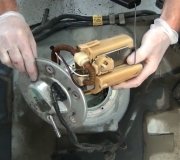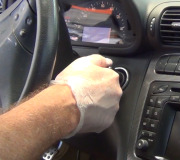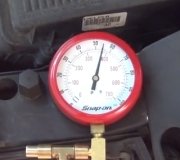I tested a bunch of things on the car today, and was able to get this "intermittent" problem to happen EVERY time.
Here is what I learned:
--***Fuel is NOT being injected at a constant rate*** THIS IS WHAT'S CAUSING TO PROBLEM (though I don't yet know the cause of THAT cause)
--but ONLY when the engine temperature is warm.
--and ONLY JUST AT STARTUP.
--and ONLY if the engine has not just been running fine a few seconds before (must wait 10 minutes after engine has been running and turned off, to reproduce the problem).
--The problem will NEVER happen when it's very cold outside and the car has been sitting, and the engine is ice-cold.
--The problem will ALWAYS happen if it's either warm outside, **OR** I have run the engine for 15 minutes to get it warm and THEN let it sit for 10 minutes (simulating warm-weather startup conditions).
--When the problem happens, if I manually drip gas into the intake from a drip-bottle, it will eliminate the problem and get past the startup phase and then run on its own (without the drip-bottle). This is because when it (the problem) happens the fuel injector is spraying gas intermittently (spraying, then not spraying, spraying, then not spraying). The fuel injector is definitely NOT the problem (unless it is failing at only one specific temperature, and that seems unlikely).
So. It must be the computer or some fuel delivery electronic system failing at a certain temperature.
Things I have tested or replaced and know to be good:
--Fuel pump (replaced)
--Fuel filter (replaced)
--Coolant temp sensor (replaced)
--MAP sensor (replaced)
--O2 sensor (replaced)
--ignition coil (tested, spark is strong, the system is just not sending enough fuel when the problem happens)
--alternator (giving 14.35 volts once engine is running)
--distributor ignition module chip (tested)
--Throttle Position Sensor (I unplugged it while the problem was happening, and it made NO difference).
Things I tried at exactly the moment when the problem is happening:
--While problem happening, unplugged MAP sensor. NO EFFECT. (Through engine ran a bit rougher when this was unplugged, as expected, the problem was exactly the same, just with some added roughness in addition to the original problem)
--While problem happening, unplugged MAT sensor. NO EFFECT.
--While problem happening, unplugged Throttle Position sensor. NO EFFECT.
--While problem happening, unplugged Coolant Temp sensor. NO EFFECT.
--While problem happening, used bottle of gas with thin drip-straw to manually drip gas into intake. PROBLEM ELIMINATED--though not fixed, of course.
Note: When I say "NO EFFECT" I mean there was no effect on the problem whatsoever (same as if I hadn't unplugged anything). Though the "Serve Engine" light was activated by unplugging those things, and error codes were registered in the computer as you'd expect.
The problem either happens or it doesn't. It's like a "switch" is turned on or is not turned on. Causing the problem to happen or not happen.
AND TEMPERATURE IS THE KEY to it all.
If the engine is warm (but has been turned-off for at least ten minutes without running), the startup cycle will not work right and fuel will not be sprayed out of the injector at a constant rate--causing the engine to idle fast, then slow, then fast, then slow, then die (all in about 8 seconds). (E.G. Fuel injector spraying, then not spraying, spraying, then not spraying, during this startup period)
This happens EVERY TIME these conditions are met--Like clockwork.
Does this tell you anything? It seems like we're close to a solution?
I suspect the Engine Control Computer is bad, or perhaps some sensor (that I don't know about) is feeding wrong info to the computer. I did have the computer replaced 5 years ago, but I can't imagine what else it could be! (With my limited knowledge of cars)
QUESTION:
How does the computer get temperature info about the engine temperature? It's NOT getting it from the coolant temp sensor as far as I can tell.
Could it be something like:
--Faulty sensor sending wrong temp to ECM?
--Bad Manifold Air Temperature (MAT) sensor?
--Idle Air Control Valve (I tested it some, and it appears to move, but I still need to measure the resistance on the leads)
--ECM computer bad?
--Fuel Injector Pressure Regulator?
--Fuel Pump Relay? (Keeping fuel pump from getting reliable electricity at startup?)
--Something disrupting electricity to fuel pump and/or fuel injector?
Seems like it's got to be something more "electronic."
Tuesday, December 1st, 2009 AT 7:01 PM




